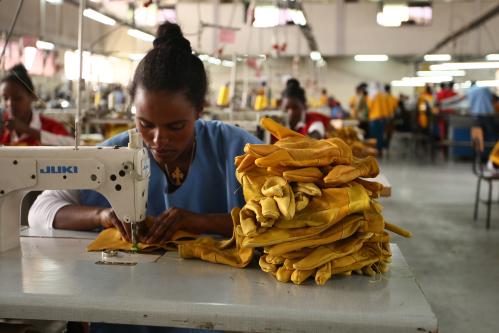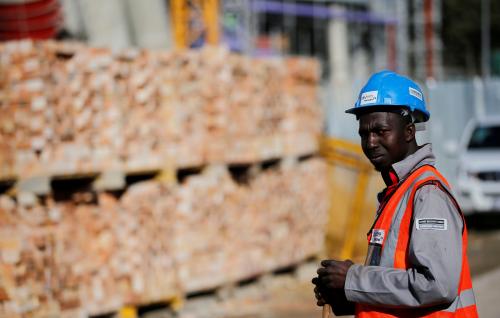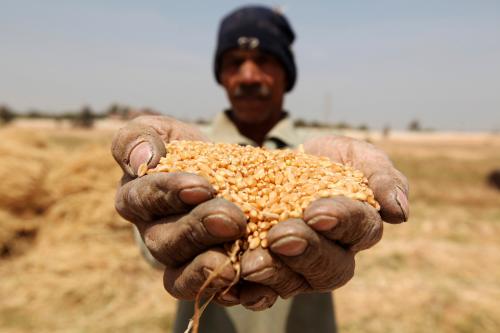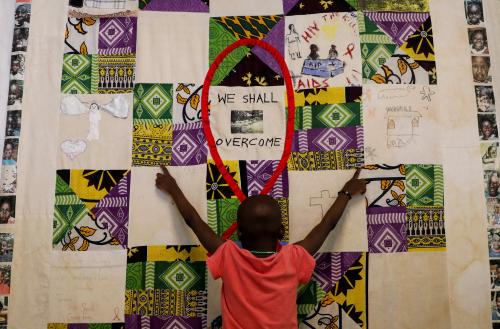Growth across Sub-Saharan Africa has weakened since 2015, and the poor outlook for commodity prices has cast doubt on the region’s economic promise, leading critics to conclude that Africa’s economic heyday is over. Yet the gains that African economies have made are real, and will not be easily reversed. This piece originally appeared on Project Syndicate.
Between 2000 and 2014, Africa grew at a strong clip, fueling belief in the narrative of an “Africa rising.” But, since 2015, growth across Sub-Saharan Africa has weakened, and the poor outlook for commodity prices has cast doubt on Africa’s economic promise, leading many to question the “Africa rising” narrative—and some to pronounce it dead.
Such skepticism is, to some extent, understandable. The 2014 oil-price shock hit several African economies especially hard, and played a role in pushing aggregate growth down from 5-6% in 2004-2014 to just 2.5% in 2015-2017 – a rate that barely keeps up with population growth.
Moreover, the continent’s three largest economies—Angola, Nigeria, and South Africa—have experienced major declines in performance. Last year, Angola and South Africa’s economies stagnated, while the Nigerian economy actually contracted for the first time since 1991. The latest projections suggest that these economies will experience tepid recoveries in the coming years.
But Africa’s skeptics have overlooked a number of important factors. For starters, when one sets the three largest economies aside, Sub-Saharan Africa’s aggregate-growth rate for this year rises from 2.5% to almost 4%. That is faster than the 3.5% rate at which the global economy is currently growing. In fact, five of the ten fastest-growing economies in the world are in Africa. And over the next five years, around half of all Sub-Saharan economies will expand at an average rate similar to or higher than that which prevailed during the “Africa rising” heyday.
Furthermore, high commodity prices were just one factor in the region’s strong economic performance between 2000 and 2014. Many African countries have made vast improvements to macroeconomic management, governance, and the business environment, and entrepreneurship is on the rise. Even with lower commodity prices, these developments will continue to bolster many African economies.
Today’s skepticism may reflect lasting memories from a darker period, and fears that Africa’s progress has not been sufficiently consolidated. From the 1970s to the mid-1990s, dictators ruled in many African countries, and the institutions necessary for sustaining strong economic growth were fragile at best. With civil wars constantly shredding the social fabric in many countries, the continent experienced decades of tepid economic growth. By 2000, it had been reduced to what The Economist called “Hopeless Africa.”
But those days are gone. Policymakers across the continent have sustained the 1990s-era reforms that set the stage for the subsequent period of high growth. Although there is still much work to be done, the economic and business environment in many African countries has continued to improve, and institutions and governance have grown stronger.
Owing to new information and communication technologies, Africans, particularly young Africans, are better informed, more engaged in civil and political discourse, and increasingly capable of holding their leaders accountable. ICTs have also unleashed a wave of innovation and entrepreneurship across the continent.
These positive trends are not likely to be reversed, and will continue to improve the economic conditions in Africa, even if commodity prices do not rebound. After all, the region’s economic growth averaged 5.6% between 2000 and 2004, before commodity prices had begun their rapid ascent.
But that is not to say Africa will be spared from daunting challenges in the years ahead. Globally, the economic environment will become less favorable for African economies. In the major advanced economies, interest rates will soon rise, and the political backlash against globalization may force governments to abandon their past commitments to development assistance.
In light of all this uncertainty, African policymakers should look inward, by focusing on policies to mobilize national resources and finance their economic agendas. Those agendas should include a number of key priorities. African countries need to diversify their economies to withstand future shocks better, while also accelerating the pace of industrialization across the continent. Governments will have to find a way to create decent jobs for the 11 million people now entering the region’s labor force every year. And they will need to enact policies to reduce poverty, and ensure that prosperity is shared across all cohorts of society.
These are particularly important goals for Angola, Nigeria, and South Africa. Angola and Nigeria need to become far less reliant on oil; and South Africa still needs to implement far-reaching reforms to address structural problems that have plagued it since the apartheid era. Seeing these projects through will require competent political leaders who are committed to the principles of good governance. Failure could result in an extended period of low growth.
But even if Africa’s three largest economies do end up in the doldrums, it will not necessarily seal the fate of the “Africa rising” story. After all, “Africa rising” need not mean “all” of Africa. From the 1960s to the 1990s, the “Asian Tigers” narrative referred only to Hong Kong, Singapore, South Korea, and Taiwan, excluding other developing countries in Asia, such as China. Similarly, African economies are increasingly differentiating themselves, and should thus be evaluated individually, on the merits of their respective economic policies.
The Brookings Institution is committed to quality, independence, and impact.
We are supported by a diverse array of funders. In line with our values and policies, each Brookings publication represents the sole views of its author(s).







Commentary
Op-edIs Africa still rising?
October 6, 2017